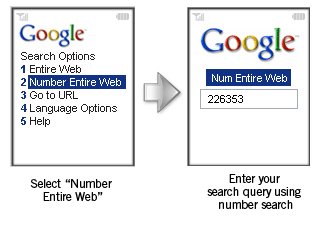DigitURL now provides users with a near replica of Google Number Search translation for short wordnumber (numeric) entries. It has done this without the use - so it appears - of a manually created database of urls with their wordnumber translations.
Take for instance the string '222.' DigitURL returns every popular brand associated with that wordnumber. You get ABC. You get BBC. You get CBC (Canada Broadcasting Company). And ALL within 4 keytaps of opening the DigitURL app or bookmarked link. Compare with typing out BBC.com, an incredibly long 14 taps (w/o the dot).
This is precisely the type of search query that, of all available web-services, only Google Number Search could handle (until now). View, for comparison, what results GNS provides for the same search query of '222':
http://www.google.com/search?q=num%3A222 What is significant is that both services provide results for short wordnumber strings that are
meaningful - the results for 2 or 3 digit wordnumbers are ranked in a similar sort of way that search engines provide. That is a pretty difficult task considering that any 3-digit wordnumber, for instance, could be associated with 27 dotcom domains (more for the numbers 7 and 9 which have four letters assigned to them) - assuming that every LLL.com is regged. The situation gets even more complex when you think of all the other cc TLDs. There is significantly less competition for wordnumbers (including dotcom wordnumbers) that are four or more digits in length. Yet DigitURL does both just fine - most major brands with URLs of a medium to long length are represented by their wordnumber (6977223 is MySpace) and wordnumber search queries for brands with tiny URL lengths go to the popular brands you know.
The problem - and it may be intentional - is that there is a local bias that we're experiencing using DigitURL, which is based in Australia; Jamptap is based in the U.S. A trial of the wordnumbers for the 3 digit domains listed in Alexa's top 100 sites in Australia work perfectly - but those in the U.S. top 100 don't.
For instance, several domains (of brands that are 2-3 digits long) in the Australian Alexa top 100 including go.com (#50), NSW (#52), VIC (#65), IGN (#70), qq (#76) and even HI5.com (#85) are represented in the results (assigned with accesskeys) when their wordnumbers are entered. This is not the case with the Alexa U.S. top 100 - the brands of many wordnumbers aren't shown in the results.
This begs the question, is DigitURL positioning itself as an internet company primarily targeting Australian consumers? This was the initial posture of WordDial, which began with a near exclusive New Zealand base of users, and since has been building an international clientelle and user base. Without knowing how DigitURL completes its wordnumber translations, it is difficult to suggest how its results could be improved. It is our assumption that DigitURL's algorithm is linked to a search engine with local bias for Australia - we could be wrong about this. If this was the case, then changing that association to a 'global' search engine would be better - at least if maximizing profits is the goal of their business. Certainly DigitURL could do their own geotargeting based on users' ip addresses and provide search results accordingly.
Update1: DigitURL's algorithm also works on some 4 digit or longer wordnumbers - the algorithm is easier to test (and more impressive) using 2 and 3 digit wordnumbers, of course. We found success with the wordnumbers for nearly every single major brand/website in Australia and also for generic words such as 'match', 'money', 'chat', 'love', 'mobile', 'ymail', and others that aren't mentioned on the Short DigitURL list. In sum, DigitURL has stumbled upon an early-stage all-purpose DNS (DigitURL Number System) made for Australians. What about the rest of us?
Labels: DigitURL, gns, wordnumber

